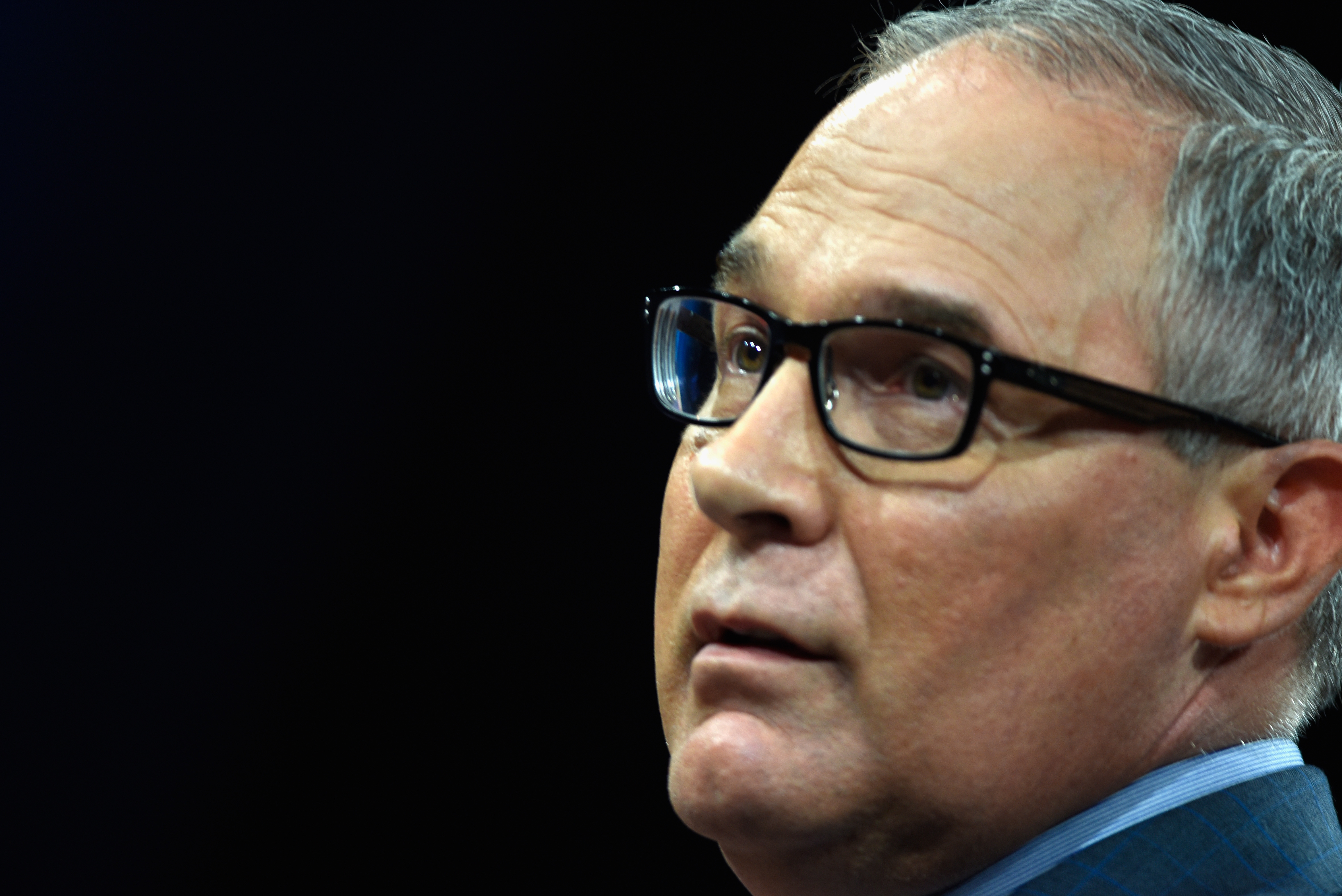The Trump administration is following a familiar pattern with today’s proclamation that it will try to rescind the carbon-cutting Clean Power Plan: Announce a major policy shift without offering any details or scientific support. At a staged event in Hazard, Kentucky, Environmental Protection Agency Administrator Scott Pruitt reached for well-worn anti-regulatory rhetoric: “The war on coal is over,” he said, trying to make it sound like the rollback is a done deal.
In fact, undoing an established EPA regulation is a daunting task that includes a rigorous rule-writing process with several stages of review and public comment. And multiple groups, as well as state governments, will be sure to challenge the EPA in court, which potentially means several more years of regulatory uncertainty for industry.
Several other recent Trump administration efforts to undo environmental rules have been reversed or rebuffed by courts, including a mandate to cut methane leakage. Other big-picture coal-related rules are still in litigation, including coal-mine leases in Wyoming. Altogether, the attempted reversals, appeals, and lawsuits have created a chaotic regulatory landscape—and that’s not good for communities or for businesses.
The 2015 Clean Power Plan aimed to cut cut CO2 emissions in the United States by 32 percent from 2005 levels by 2030. It was adopted after long consultation with states, and gave them a great deal of self-determination in reaching the goals of the plan. The Supreme Court put the plan on hold last year, pending today’s announcement.
Trying to undo the plan may provide the kind of coal country photo opportunity that Pruitt enjoys, but it won’t play well across much of the country.
The plan was also at the core of the U.S.’s pledge to the Paris Agreement, and it’s not clear how much of an effect today’s announcement will have on that effort, according to climate scientist Michael Mann, director of the Earth System Science Center at Pennsylvania State University.
“This will likely make it more difficult for the U.S. to make good on its obligations under the Paris [Agreement],” Mann tells Pacific Standard. “Blue states are already pretty much on board, but this will provide license to red state governors who would rather advance the agenda of the polluting interests who fund their campaigns than the good of the citizens they represent.”
But Mann also says that market forces alone are driving coal out of business. The effort to rescind the Clean Power Plan is not going to change that.
“There’s a good chance that we can make good on our Paris obligations based on the tremendous progress we’re seeing at the state and municipal level when it comes to the transition toward renewable energy,” Mann says.
Legal experts claim it is too soon to comment on whether the rollback will be successful, saying they prefer to weigh in after the agency publishes the details of its proposal in the Federal Register.
And the EPA will have to do some fancy legal maneuvering because the agency has a legal obligation to protect public health—namely by enforcing the Clean Air Act, according to David Doniger, director of the Natural Resources Defense Council’s Climate and Clean Air Program.
“You have to have a very convincing explanation [that] what you’re doing meets the requirements of law, and how your claims square with facts and science,” Doniger tells Pacific Standard.
Doniger says a leaked version of the proposed repeal won’t meet the requirements of the Clean Air Act. (Writing on his NRDC blog, Doniger noted that President Donald Trump’s version is more like a “dirty power plan.”)
“He [Pruitt] cooks the books on damages from climate pollution,” Doniger says. “It may change from the leaked version, but what’s there now won’t stand up to scrutiny. This is crude stuff. The courts won’t buy it.”

(Photo: Riccardo Savi/Getty Images for Concordia Summit)
Trying to undo the plan may provide the kind of coal country photo opportunity that Pruitt enjoys, but it won’t play well across much of the country. In polls over the past year, the majority of Americans said they don’t want Trump to undo climate regulations. In one poll, as many as 67 percent of Americans supported pollution limits on coal-fired power plants.
Doniger says the attempt to undo the plan merely increases long-term uncertainty about how climate pollution will ultimately be addressed, as required by the EPA’s earlier finding that CO2 is a danger to the public, a finding that was upheld by the U.S. Supreme Court.
“The people that run the power industry know that climate change will outlast the administration. They know that the Clean Air Act will outlast the administration, and they are not banking on what the Trump administration is doing,” he says.
That holds on a global scale too, Mann notes.
“Neither Trump, Pruitt, nor the Koch Brothers can stop the global renewable energy revolution that is underway,” he says. “They can only buy their polluters friends a little bit of extra time and profit and hold the U.S. back as the rest of the world moves ahead and takes a leadership role.”




